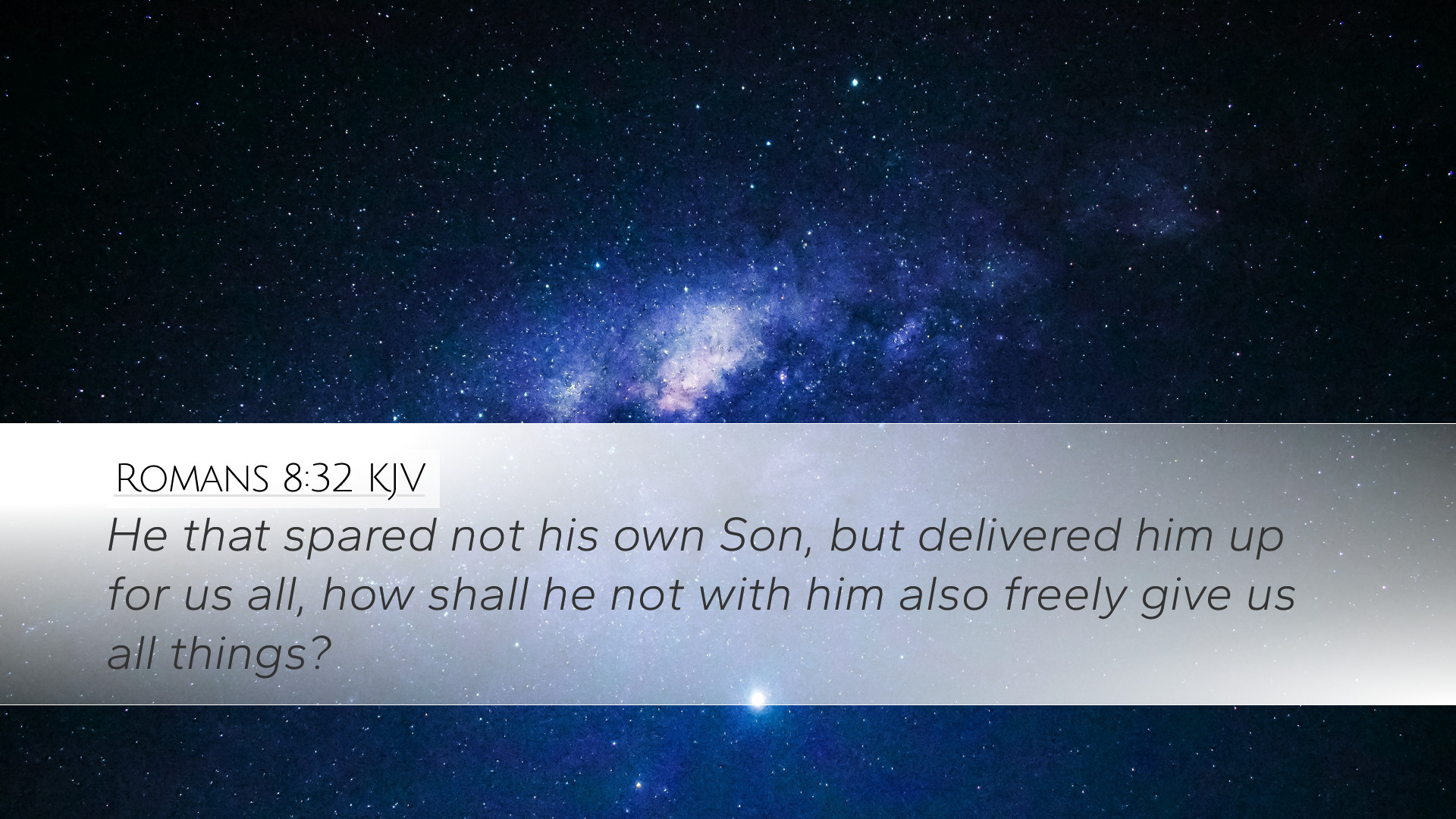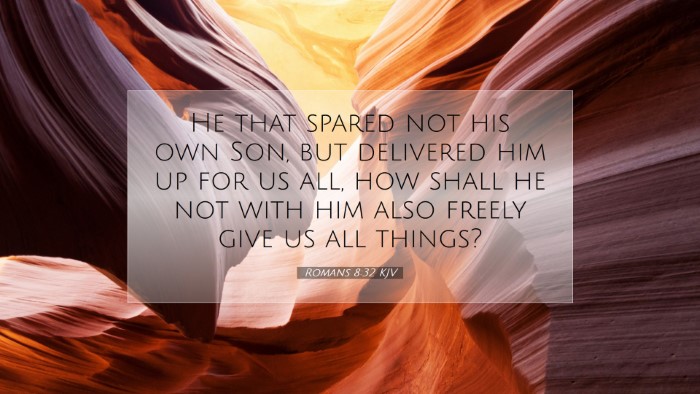Commentary on Romans 8:32
Verse: "He that spared not his own Son, but delivered him up for us all, how shall he not with him also freely give us all things?"
Introduction
This profound verse from the book of Romans encapsulates the essence of God's generosity and love in the context of salvation. The apostle Paul emphasizes the enormity of God's sacrifice in giving His Son, Jesus Christ, for the redemption of humanity. The argument here flows into a powerful assurance regarding God’s willingness to provide all that is necessary for those who are in Christ. This exploration draws on insights from noted biblical commentators.
God's Ultimate Sacrifice
Matthew Henry remarks on the staggering nature of God’s gift of His own Son. The phrase "spared not" underscores the intensity of God’s love; He did not hold back from the ultimate sacrifice. Henry points out that this act demonstrates not only God's willingness but also His commitment to humanity’s redemption. It compels believers to consider the depths of God’s grace.
Albert Barnes further emphasizes the "delivered him up" aspect, illustrating that this is a deliberate act of handing over. Barnes notes that the use of the term implies a great cost and a significant parting, recognizing that God did not take the path of least resistance but instead chose the pathway of suffering for the sake of salvation.
Adam Clarke also underscores the significance of this delivery, asserting that God’s act was premeditated and based on infinite wisdom. He opines that the depth of God’s love is magnified by the gravity of the sacrifice made on behalf of humanity.
The Argument from Greater to Lesser
The rhetorical question posed in the latter half of the verse, "how shall he not with him also freely give us all things?" envelops the reader in a wonderful assurance of God’s provision. This argument from the greater to the lesser is crucial in understanding the overall theology presented in this scripture.
- Assurance of Provision: If God can provide the greatest gift, then it follows logically that He can and will provide for lesser needs.
- Biblical Context: Paul’s argument here is strategic; it reassures believers that their needs will be met because of the magnitude of God’s initial act of love.
- Spiritual Significance: The text raises awareness that all things—spiritual and material—are under God's providence and care for those who believe.
The Nature of God's Gifts
Paul uses the word "freely," which holds deep implications for the nature of God's gifts. Matthew Henry draws attention to the unmerited nature of these gifts. God gives not because of any inherent worth in humanity but purely out of His grace and love.
Albert Barnes adds that this concept of "freely" indicates that God's blessings are given without obligation. It highlights the generous spirit of God—He is not transactional or conditional in His giving.
Adam Clarke discusses the broader implications of "all things," suggesting that it encompasses everything necessary for life and godliness. He offers the perspective that God’s provision is holistic and relational, covering both spiritual needs and physical sustenance.
Theological Implications
This verse embodies significant theological truths that resonate deeply with the faith community:
- The Doctrine of Justification: The delivery of Christ for humanity sets the foundation for the doctrine of justification. Believers are assured of their status before God through the sacrifice made on their behalf.
- The Assurance of Salvation: Knowing that God has not withheld His Son provides an unwavering assurance of salvation for believers. This reflects the trustworthiness of God’s promises.
- The Nature of God’s Love: The love demonstrated in this act is sacrificial and unconditional, encouraging believers to emulate this love in their interactions with others.
Application for Believers
This verse calls for reflection among believers about their relationship with God, portraying a God who is profoundly invested in their well-being:
- Trust in God’s Provision: Believers are encouraged to trust God for both their spiritual and physical needs, knowing that He will not withhold good from those who love Him.
- Embrace of God’s Grace: Understanding the breadth of God's grace can inspire believers to extend grace and forgiveness to others.
- Encouragement in Trials: In times of adversity, believers can recall this promise as a source of hope and strength, reminding themselves of the unfathomable gift offered by God.
Conclusion
Romans 8:32 stands as a monumental declaration of God’s love and provision. Through the insights of Matthew Henry, Albert Barnes, and Adam Clarke, we see a multifaceted understanding of what it means to truly receive from God. The depth of this verse draws believers into a deeper relationship with the Creator, urging them to both understand and trust in His abundant grace. Through the lens of this scripture, one is invited to reflect on the transformative power of God’s sacrifice and the precious assurance that accompanies it.


